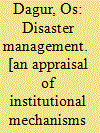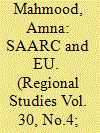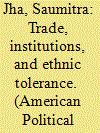|
|
|
Sort Order |
|
|
|
Items / Page
|
|
|
|
|
|
|
| Srl | Item |
| 1 |
ID:
108731


|
|
|
|
|
| Publication |
New Delhi, KW Publishers Pvt Ltd, 2011.
|
| Description |
xvi, 385p.
|
| Standard Number |
9789380502724
|
|
|
|
|
|
|
|
|
|
|
|
Copies: C:1/I:0,R:0,Q:0
Circulation
| Accession# | Call# | Current Location | Status | Policy | Location |
| 056382 | 363.34/DAG 056382 | Main | On Shelf | General | |
|
|
|
|
| 2 |
ID:
174932


|
|
|
|
|
| Summary/Abstract |
This paper explores and assesses the presence/absence of institutional arrangements in educational settings for addressing the concerns of gender-variant children (GVC) through a sample survey of schools in the three-country context of India, Sri Lanka and Nepal. This research highlights the need for effective regulatory, normative and cognitive structures to address issues of childhood gender variance. With a contextual analysis of recent developments and comprehensive study of data reports in the three countries, the study analyses multiple dimensions of discrimination and bullying of GVC in educational settings. Using qualitative and quantitative methods, this paper highlights causes and issues associated with the problems of GVC as well as affirmative actions and institutional practices required to be implemented in schools in the three-country context. The results and findings provide evidence that academic institutions in India, Sri Lanka and, to some extent, Nepal lack institutional mechanisms to address issues of homophobia, abuse by peer group, mental health issues, emotional challenges, social discrimination, lack of opportunities, lack of monitoring and counselling, micro-level engagements and high dropouts of GVC. This study also charts out futuristic agenda, such as comprehensive mapping of GVC in schools, implementation of effective counselling mechanism, the need to create and adopt basic reference module for educators around gender diversity and variance.
|
|
|
|
|
|
|
|
|
|
|
|
|
|
|
|
| 3 |
ID:
118287


|
|
|
| 4 |
ID:
127835


|
|
|
|
|
| Publication |
2013.
|
| Summary/Abstract |
I provide evidence that the degree to which medieval Hindus and Muslims could provide complementary, nonreplicable services and a mechanism to share the gains from exchange has resulted in a sustained legacy of ethnic tolerance in South Asian towns. Due to Muslim-specific advantages in Indian Ocean shipping, interethnic complementarities were strongest in medieval trading ports, leading to the development of institutional mechanisms that further supported interethnic exchange. Using novel town-level data spanning South Asia's medieval and colonial history, I find that medieval ports, despite being more ethnically mixed, were five times less prone to Hindu-Muslim riots between 1850 and 1950, two centuries after Europeans disrupted Muslim overseas trade dominance, and remained half as prone between 1950 and 1995. Household-level evidence suggests that these differences reflect local institutions that emerged to support interethnic medieval trade, continue to influence modern occupational choices and organizations, and substitute for State political incentives in supporting interethnic trust
|
|
|
|
|
|
|
|
|
|
|
|
|
|
|
|
|
|
|
|
|